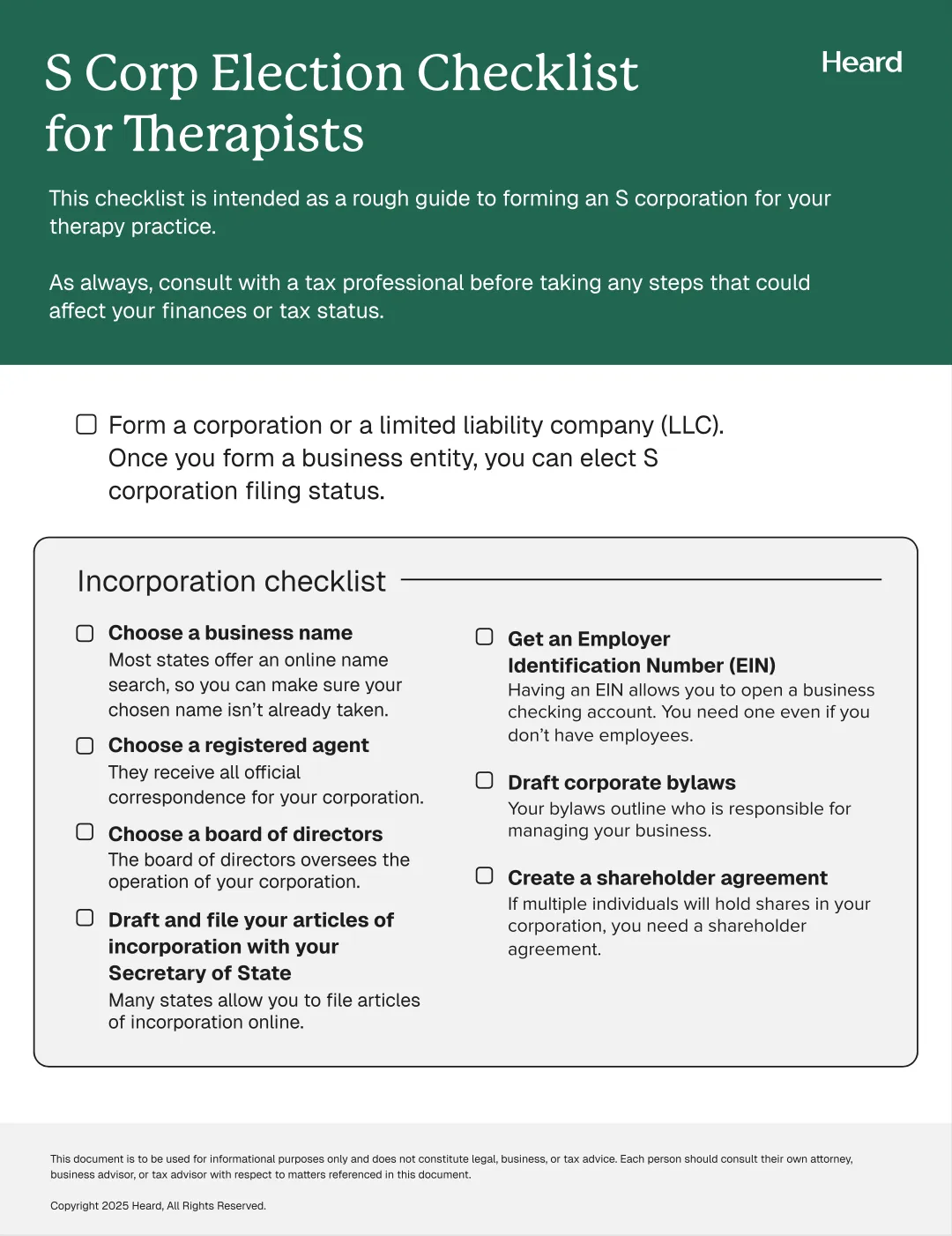There are many good reasons to elect S corporation status for your therapy practice.
But the S corp is not the be-all and end-all of business structures. In fact, depending on your practice, electing S corp status could put you at a disadvantage.
The path you decide to take—whether to elect S corp status, or choose a different business structure—will depend on the size, needs, and trajectory of your therapy practice.
Before you make a major decision, consider these five disadvantages to the S corp structure.
Heads up: Not sure what the difference is between an S corporation, a sole proprietorship, and all the other business structures out there? Check out our complete guide to S corporations for therapists.
The cost of formation
It costs money to convert your therapy practice to an S corporation. There are two major expenses you should be prepared to cover up front: Hiring an accountant and registering your LLC.
Hiring an accountant
Even if you’re used to filing your own taxes and handling other financial paperwork, it’s wise to consult with an accountant before making the jump—either to get their advice, or to have them handle the (sometimes confusing) process of electing S corp status.
Accountants’ fees vary depending on whether you’re looking for a simple consultation or a full S corp election. S corp formation comes standard at no additional fee when you use Heard.
Registering your LLC
Typically, to become an S corp, you first form an LLC for your therapy practice at the state level, then elect S corp status at the federal level. If you’re in California, then you’ll need to form a professional corporation instead.
You register an LLC by filing the necessary paperwork with your Secretary of State or equivalent office. To learn the steps involved, check out our LLC registration checklist.
Once your LLC is formed, you file Form 2553 with the IRS to elect S corporation status.
The cost of registering your LLC varies considerably from one state to the next. For instance, in Montana, it costs $35, while in Alaska it costs $250.
Make sure to budget for registering an LLC in your state, and don’t forget to take into account the cost of your annual renewal fee (more on that in a moment).
{{resource}}
Increased ongoing expenses
Besides the upfront cost of formation, you should be prepared to pay to keep your S corp running. There are costs associated with having an S corporation that you don’t have to worry about when you’re a sole proprietor. Even as you consider the benefits of switching to an S corp, it’s important to keep these in mind.
LLC renewal fees
Most S corp therapy practices form as LLCs at the state level, and file as S corporations with the IRS.
In many states, it costs money to maintain your LLC status from one year to the next. And even if the state where you’ve formed your LLC charges a small annual renewal fee, they may charge franchise tax, which can take a significant bite out of your cash reserves.
For instance: In California, therapists are required to form Professional Corporations rather than LLCs. (Professional Corporations are treated similarly to LLCs, but they’re designated for certain professions, like therapists.) The annual filing fee for a Professional Corporation is $25, while franchise tax is $800. That means you must pay the State $825 per year just to maintain your Professional Corporation.
Increased accounting and bookkeeping fees
If you’ve been filing your own taxes and doing your own bookkeeping, prepare for a change once you elect S corp status. Filing an S corp tax return is more complex than filing a sole proprietor return, with more opportunities to make an error.
Most S corps hire a professional accountant to file for them. Fees to file a business tax return for an S corp (Form 1120-S) land in the neighborhood of $1,000 to $1,200, depending who you hire. For more details on pricing, check out our article on hiring an accountant for your therapy practice.
And in order to file an accurate return, you need up-to-date books. Be prepared to hire a professional to handle your bookkeeping.
Payroll service
Once your therapy practice becomes an S corporation, it’s standard procedure to hire yourself as an employee and pay yourself a reasonable salary.
While it’s possible to do all the paperwork by hand—filing the necessary forms, plus remitting and withholding income tax, FICA, and state taxes from each paycheck—you save yourself an enormous amount of time (and avoid costly errors) when you sign up for a payroll service.
That being said, an online payroll service like Gusto (which integrates with Heard) starts at around $40 per month.
{{resource}}
Potential for errors
Compared to a sole proprietorship, an S corporation is a more complex operation overall. That added complexity brings with it more potential pitfalls, particularly if you try to do your own bookkeeping, tax filing, or payroll.
In an ideal scenario, the cost of hiring professionals to handle these tasks is more than made up for by the tax savings you enjoy as an S corporation. But if you’re operating just below the salary threshold that makes S corp status profitable, it’s tempting to handle the added paperwork yourself.
Some common errors S corp owners make when taking the DIY approach:
- Failure to set a reasonable salary. If the IRS determines your salary is too low, they may retroactively charge you self-employment tax on income you earned as distributions.
- Errors filling out Form K-1. In principle, Form K-1 is simple, reporting how much of your S corp you own and how much you earned in distributions over the course of the year. In practice, filling out a K-1 is not so straightforward, and mistakes could lead to costly IRS penalties.
- Annual LLC reporting. The state where you register your LLC requires you to complete annual reports in order to maintain LLC status. Each state differs in their requirements and how the report must be filled out. Errors could put your LLC status at risk.
- Misattributing income and expenses. Your personal income and expenses and your S corp’s income and expenses must be separate and distinct. Intermingling them could pierce the corporate veil and lead to trouble if creditors come calling.
These are just the most common potential errors. There are plenty of ways to go wrong running your LLC—that’s why it’s important to hire professional help.
No tax savings below a particular income threshold
Electing S corporation status only makes sense, tax-wise, once you’re earning a certain amount of annual income.
Below that threshold, the tax savings you enjoy from an S corp versus a sole prop are virtually nil, and you may even end up paying more (thanks to some of the costs associated with running an S corp, covered above) than you would with S corp status.
So, what’s the threshold? Different accountants will have different opinions, and a deep dive into the math behind it has the potential to induce a stress headache.
But our official line at Heard is that any therapy practice making less than $100,000 in annual net income is unlikely to benefit from S corp status.
This isn’t so much a disadvantage of the S corporation structure as a caveat to keep in mind when deciding which business structure is right for your practice.
{{resource}}
Increased risk of being audited
First of all, your risk—as a small business—of ever being audited is very, very low. And so long as your books are up to date, you’ve accurately filed your taxes, and you’ve maintained thorough records, you have nothing to fear from an audit besides the inconvenience.
That being said, S corporations are at a higher risk than sole proprietors of being audited. There are more opportunities to dodge taxes—self-employment tax, in particular—when your business is an S corp, so the IRS is more interested in making sure S corps play by the rules.
It’s hard to find accurate, up-to-date information on how frequently S corporations are audited by the IRS. One fairly outdated resource puts the risk at around 0.42% per year. But the IRS is always changing up their strategies, and it’s difficult for a mere mortal to get a sense of their inner workings.
Suffice it to say that, if you elect S corp status, it’s essential to get professional support for your bookkeeping, accounting, and payroll needs, and maintain a complete set of financial records.
—
Still not sure whether S corp status is right for your practice? Check out our complete guide to S corporations for therapists.
This post is to be used for informational purposes only and does not constitute legal, business, or tax advice. Each person should consult their own attorney, business advisor, or tax advisor with respect to matters referenced in this post.
Bryce Warnes is a West Coast writer specializing in small business finances.
{{cta}}
Manage your bookkeeping, taxes, and payroll—all in one place.

Discover more. Get our newsletter.
Get free articles, guides, and tools developed by our experts to help you understand and manage your private practice finances.





